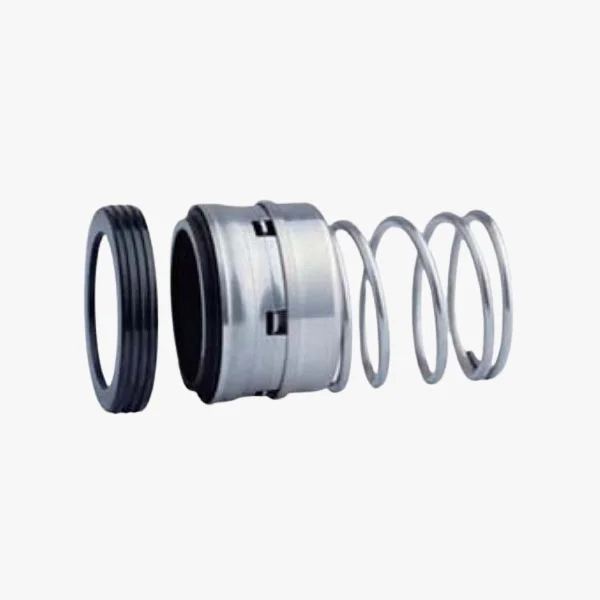In rotating machinery such as pumps, compressors, and mixers, elastomer bellow shaft seals play a critical role in preventing fluid leakage and ensuring efficient operation. These seals combine flexibility, durability, and simplicity, making them ideal for a wide range of industrial applications. However, achieving optimal performance depends on thoughtful design and careful consideration of operating parameters such as pressure, temperature, and rotational speed.
Ningbo Wecan Seals Co., Ltd. is a professional manufacturer and exporter specializing in high-quality mechanical seals and sealing solutions. With its own factory and advanced R&D capabilities, Wecan provides precision-engineered elastomer bellow shaft seals designed to meet diverse industrial requirements while maintaining durability and reliability under varying working conditions.

1. Understanding Elastomer Bellow Shaft Seals
An elastomer bellow shaft seal is a mechanical seal that uses an elastomeric (rubber-like) bellows as the secondary sealing element. The bellows provide flexibility, compensate for shaft misalignment, and eliminate the need for a separate dynamic O-ring. These seals are widely used in pumps, agitators, and other rotating equipment where space is limited and ease of installation is important.
The bellows are typically made of EPDM, NBR, FKM (Viton®), or silicone rubber, each chosen based on chemical compatibility and operating conditions.
2. Pressure Considerations
Pressure is one of the most critical parameters influencing the design and performance of elastomer bellow shaft seals.
-
Low-pressure systems (below 10 bar): Standard elastomer bellows are sufficient for water pumps, HVAC systems, and general industrial use.
-
Medium-pressure systems (10–25 bar): Reinforced bellows or metal-supported designs are preferred to prevent distortion or extrusion under high load.
-
High-pressure applications: Require customized designs with balanced seal faces and optimized spring loading to maintain stability.
At Ningbo Wecan Seals Co., Ltd., each seal undergoes rigorous pressure testing to ensure structural integrity and leak-tight performance, even under challenging conditions.
3. Temperature Factors
Temperature variations significantly affect the elasticity and chemical stability of elastomer materials.
-
NBR (Nitrile Rubber): Performs best between -20°C to +100°C, suitable for oils and hydrocarbons.
-
EPDM: Excellent for water, steam, and mild chemicals, stable up to +150°C.
-
FKM (Viton®): Ideal for high-temperature environments, withstanding up to +200°C and offering strong resistance to aggressive fluids.
When designing a sealing system, engineers must select the elastomer compound that matches the fluid medium and temperature range to prevent premature wear or hardening.
Wecan Seals uses premium-grade elastomers that maintain flexibility and compression set resistance across extended thermal cycles, ensuring consistent sealing performance.
4. Rotational Speed and Dynamic Performance
Rotational speed affects heat generation, friction, and wear on the sealing faces.
-
Low to medium speed (up to 3,000 rpm): Standard bellows seals perform well with minimal friction.
-
High speed (above 5,000 rpm): Requires precision balancing, low-friction materials (like carbon vs. SiC), and effective cooling mechanisms.
Proper alignment and surface finish of the shaft also influence seal life and performance. Wecan’s seals are manufactured with tight dimensional tolerances and precision lapping to ensure minimal face distortion and stable operation under varying speeds.
5. Chemical Compatibility and Fluid Type
The fluid being sealed — whether it’s water, oil, acid, or gas — determines the choice of elastomer and face material combination:
-
Carbon vs. Ceramic: For clean water and mild fluids.
-
Silicon Carbide vs. Silicon Carbide: For abrasive or corrosive media.
-
Tungsten Carbide vs. Carbon: For high-pressure and high-viscosity applications.
Ningbo Wecan Seals customizes each design according to medium compatibility and process conditions, ensuring extended service life and reduced maintenance costs.
6. Installation and Alignment
Improper installation is a leading cause of seal failure. Elastomer bellow shaft seals should be mounted carefully to avoid over-compression or twisting of the bellows. Shaft alignment, surface finish, and cleanliness all play a vital role in achieving a leak-free setup.
Wecan Seals offers technical guidance and installation support to ensure customers achieve precise fitment and maximum sealing performance.
7. Why Choose Ningbo Wecan Seals Co., Ltd.
As a leading mechanical seal manufacturer, Ningbo Wecan Seals Co., Ltd. integrates R&D, production, and quality control under one roof. The company’s strengths include:
-
Advanced manufacturing facilities for precision machining and surface finishing.
-
Comprehensive material testing for temperature, pressure, and chemical resistance.
-
Custom engineering services for industry-specific sealing challenges.
-
Global export experience ensuring consistent product quality and timely delivery.
Whether you’re working in the chemical, petrochemical, water treatment, or process industries, Wecan’s elastomer bellow shaft seals deliver dependable performance and long-term value.
Conclusion
Designing an effective elastomer bellow shaft seal requires a deep understanding of pressure dynamics, temperature effects, and rotational speed influences. Selecting the right elastomer compound, face material, and design configuration can dramatically improve system reliability and efficiency.
With Ningbo Wecan Seals Co., Ltd. as your partner, you gain access to cutting-edge sealing technologies, superior materials, and expert engineering support — all tailored to meet your precise operational needs. Whether for standard pumps or demanding industrial systems, Wecan’s seals ensure lasting protection, stability, and performance.
www.wecan-seals.com
Ningbo Wecan Seals Co., Ltd.